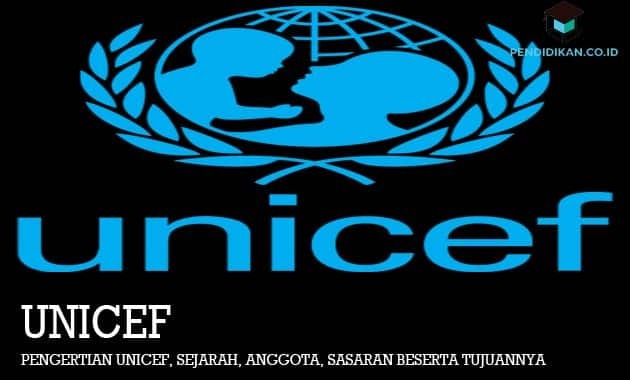UNICEF Definition, History, Members, Goals and Objectives
Education. Co. ID – This opportunity we will discuss about Unicef, an explanation of Unicef will be described as follows:

Understanding Unicef
UNICEF is an acronym for the United Nations Children's Fund. And UNICEF is one of the organizations under the auspices of the United Nations. The UNICEF organization was founded on December 11, 1946 and is located in New York, United States of America.
The organization's funds come from voluntary donations from governments, as well as individuals (rich people) from around the world.
Because of his help, more than 7000 people work in 158 countries, helping to build a world that respects children's rights. And UNICEF works around the world to tackle poverty, violence, disease and discrimination.
The History of the Unicef Organization in Indonesia
UNICEF helped Indonesia for the first time in 1948. At that time there was an emergency situation that required quick handling due to the severe drought that occurred in Lombok. And official cooperation between UNICEF and the Indonesian government was first established in 1950.
From the time of independence, UNICEF has been considered as Indonesia's partner who is committed to improving the lives of children and women throughout the archipelago.
And UNICEF's initial priority is to provide services and supplies that are very much needed to improve the health of Indonesian children and their families.
Since the early 1960s, UNICEF has developed into a development organization that is more concentrated on child welfare than just providing humanitarian assistance. And in 1962, UNICEF then implemented a nutrition program in 100 villages from eight provinces.
Foreign Minister Adam Malik signed a cooperation agreement between UNICEF and the Indonesian government after Indonesia joined the United Nations in November 1966.
Initially the focus of this collaboration focused on the survival of children. And only then will the focus develop on other issues that benefit both parties.
After that for 50 years, UNICEF has played an important role in helping governments improve the lives of children and women. And for now UNICEF works in 12 regional offices to be able to assist in implementing programs in 15 provinces covering more than 20 million Indonesians.
Together with its partners UNICEF has succeeded in helping to develop and lobby for the adoption of the 2002 Child Protection Act. And the law will be the legal basis for the protection of children's rights.
Then, Indonesia and UNICEF signed a new cooperation agreement in the 2006-2010 Five-Year Development Plan which focused on in six (6) programs: Education, Health, Water and Sanitation, Combating HIV and AIDS, Child Protection and Circumstances Emergency. The partnership for 2010 was signed on January 12, 2010.
Unicef Member List
Afghanistan, Andorra, Argentina, Armenia, Australia, Austria, Bangladesh, Barbados, Belgium, Belize, Bolivia, Brazil, Bulgaria, Cambodia, Cameroon, Canada, Finland, France, Gabon, Germany, Greece, Guyana, Honduras, Hungary, Iceland, India, Indonesia, Ireland, Israel, Italy, Japan, Kazakhstan, Kenya, Kuwait, Libyan Arab Jamahiriya, Liechtenstein, Central African Republic, Chile, China, Comoros, Costa Rica, Cuba, Cyprus, Czech Republic, Democratic Republic of the Congo, Denmark, Ecuador, Egypt, Estonia, Luxembourg, Madagascar, Malaysia, Mexico, Moldova, Monaco, Mongolia, Morocco, Mozambique, Myanmar, Netherlands, New Zealand, Nicaragua, Nigeria, Norway, Oman, Pakistan, Panama, Philippines, Poland, Portugal, Qatar, Sri Lanka, Sweden, Republic of Korea, Russian Federation, Saudi Arabia, Senegal, Singapore, Slovak Republic, South Africa, Spain, Switzerland, Thailand, The United Kingdom, Tunisia, Turkey, Turkmenistan, United Arab Emirates, Uruguay, USA, Vietnam
Unicef . Goals and Goals
Overcome all kinds of problems such as poverty, violence, the spread of disease, to discrimination in the world of children and provide various This assistance is in the form of humanitarian and long-term development for children and their mothers, especially for children in Indonesia developing countries and also of course invites all parties to be willing to support or also assist in the success of these goals (UNICEF, 2015a).
In realizing its goals, one of the ways that UNICEF does is by advocating for the various needs or interests of children, so that children can have a decent life, especially the main focus is to develop community services so that they can promote health and welfare for people children.
Broadly speaking, Unicef has a goal that focuses on children. This institution is authorized by the world's governments to provide, promote, and also protect the lives and rights of children. Community organizations, including non-governmental organizations (NGOs) partners, also play a role in Unicef's work in Indonesia and in the 190 countries where Unicef works. On the other hand, Unicef can also be used as a pattern of cooperative relationships that connect institutions in Indonesia with all forms of institutions in the world that aim to be able to care for and protect children and also his rights.
UNICEF's goals are part of the contents of the UN goals, which include the following:
- Maintaining international peace and security
- Developing brotherly relations between nations
- Cooperating with internationally in solving international economic, social, cultural, as well as humanity and in promoting respect for human rights and freedoms basic
- To become a center for the actions of nations in the pursuit of common goals
Each organization certainly has goals or results to be achieved in meeting its goals. There are three (3) targets for Unicef as an international organization, including the following:
- Cultivating children's confidence in the care of the country
- Helping young people in building a world where all children live with dignity and security
- Creating a world suitable for children.
Thus the explanation of UNICEF Definition, History, Members, Goals and Objectives, hopefully what is described can be useful for you. thank you
See AlsoUNESCO Definition, Goals, Tasks, Principles, and Pillars
See AlsoDefinition of Risk Management, its Objectives, Types and Components
See AlsoUnderstanding Cooperation, Benefits, Objectives, Types and Forms
